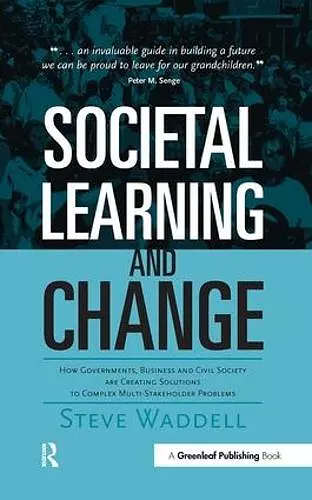Societal Learning and Change
How Governments, Business and Civil Society are Creating Solutions to Complex Multi-Stakeholder Problems
Format:Hardback
Publisher:Taylor & Francis Ltd
Published:1st Jun '05
Currently unavailable, and unfortunately no date known when it will be back
This hardback is available in another edition too:
- Paperback£37.99(9781874719939)

"Societal learning and change" is a way of describing the types of profound and wise changes needed in the way we run our affairs if we are to respond to the scale of environmental and social challenges and opportunities facing us. Its essence involves the ability to create rich relationships that bridge large differences. This is an extremely optimistic book at a time of great pessimism about the huge forces of globalisation and corporate power that seem to be overwhelming us. "an invaluable guide in building a future we can be proud to leave for our grandchildren" Peter M. Senge
This book builds on the traditions of individual and organizational learning to present a practitioner-friendly meta-framework that unlocks the strategies used by today's most innovative public-private-civic alliances and shows how these new multi-stakeholder organisations can engineer system-wide and scalable social change at the societal level.Constructing roads in Madagascar; forestry along Canada's Pacific Coast; water and sanitation projects in South Africa; community banking in the United States; constructing a new global system for corporate reporting. These all have something in common. They provide great illustrations of the types of profound and wise changes needed in the way we run our affairs if we are to respond to the scale of environmental and social challenges and opportunities facing us. They are examples of "societal learning and change". Today, this phenomenon is occurring across industries as diverse as resources extraction, infrastructure development, agriculture and information technology at the local, national, regional and global levels. Its essence involves the ability to create rich relationships that bridge large differences. This book describes this phenomenon for practitioners to help them address issues and develop opportunities more effectively. Building on the traditions of individual and organizational learning, this book suggests that our challenge is to create learning societies and processes. This involves both change in ourselves as individuals, but also change in the way the three key systems that make up our societies – the political system (government), economic system (business) and social system (civil society) – function by creating more robust interactions that respond to human and environmental imperatives rather than organizational ones. Societal Learning and Change presents a meta-framework that covers diverse approaches, including corporate citizenship, social responsibility, community development, private-public partnerships, inter-sectoral collaboration and sustainability strategies. It makes sense of all of these by emphasising that they all share the need to change relationships at the societal level and explaining how to do this from a systems perspective. The book helps overcome the conundrum where individual organisations are unsuccessfully trying to achieve big change with their stakeholders. Rather than stakeholder management with an organization-centric viewpoint, this book describes the importance of taking a stakeholder engagement and issue/opportunity-centric strategy. Wherever you are, you can make a contribution to shifting the paradigm through a societal learning and change strategy. The critical...
... an impassioned work ... * Social and Environmental Accounting Journal Vol. 26 Issue 1 *
Mr Waddell synthesizes the lessons from ... examples and provides guidance on how other organizations can move away from an adverserial approach and adopt the philosophy that "we're all in it together". * The Chronicle of Philanthropy, 29 September 2005 *
By taking a stakeholder engagement and issue/opportunity-centric strategy, the book aims to make it easier to solve differences. It does so by identifying sources of tension and opportunity and describes the processes of building relationships that can produce mutual rewards. * Sustainability Radar, August 2005 *
SLC is a brave and timely step forward, showing us that we can create solutions through enhanced engagement and the re-framing of issues for the common good. www.publish.csiro.au/ecos. Read the full review -- Sophie Constance * ECOS: Australia's magazine on Sustainability *
A readable book full of valuable insights. * Long Range Planning Vol. 39 (2006) *
ISBN: 9781874719885
Dimensions: unknown
Weight: 880g
164 pages